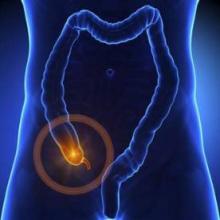Antibiotic therapy failed to be shown as noninferior to surgery in a study of adults with uncomplicated acute appendicitis, but it did resolve the problem and avert surgery with no adverse effects in 73% of patients, according to a report published online June 15 in JAMA.
Moreover, patients who did require surgery after initial antibiotic treatment did not develop significant complications and arguably were no worse off than were those who were operated on immediately. In fact, the overall complication rate was 2.8% among patients assigned to antibiotics and 7% among those assigned to antibiotics who eventually underwent appendectomy, compared with a 20.5% complication rate among patients assigned to surgery, said Dr. Paulina Salminen of the division of digestive surgery and urology, Turku (Finland) University Hospital, and her associates.
Their findings indicate that acute uncomplicated appendicitis need no longer be considered a surgical emergency, and that delaying the operation while trying a course of antibiotics “has few consequences,” they noted.
The few previous studies that have compared the two approaches had many limitations, including small study populations.
For their study, the Appendicitis Acuta (AAPAC) trial, Dr. Salminen and her associates included 530 patients aged 18-60 years who presented to six Finnish hospitals with suspected appendicitis during a 2-year period and were followed for 1 year. Appendicitis was confirmed via computed tomography (CT). Patients who had an appendicolith, perforation, abscess, or tumor were excluded from the study.
A total of 273 patients were randomly assigned to undergo immediate open appendectomy (with preoperative prophylactic antibiotics) and the remaining 257 were assigned to a 3-day course of IV ertapenem followed by 7 days of oral levofloxacin and metronidazole. If progressive infection, perforation, or peritonitis was suspected, appendectomy was performed.
Previous studies of uncomplicated appendicitis treated with antibiotics found a 70%-80% success rate, so the researchers prespecified criteria for noninferiority to surgery at 75% for the study group.
The primary endpoint for the antibiotic group – resolution of acute appendicitis with no recurrences for a full year – occurred in 73%. The remaining 27% of patients in this group underwent appendectomy during follow-up, at a median of 102 days after initial presentation. None of these patients developed abscesses or serious infections, “suggesting that the decision to delay appendectomy ... can be made with a low likelihood of major complications,” the investigators said (JAMA 2015 June 15 [doi:10.1001/jama.2015.6154]). Nevertheless, antibiotic treatment did not qualify as noninferior to immediate surgery according to the study’s preset definitions, they said.
This study was supported by a government research grant from the EVO Foundation to Turku University Hospital. Dr. Salminen reported receiving lecture fees from Merck and Roche; there were no other financial disclosures.


